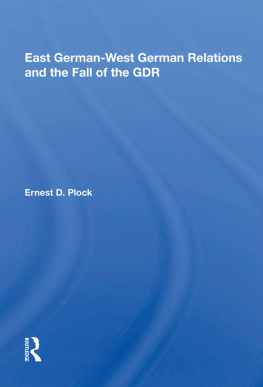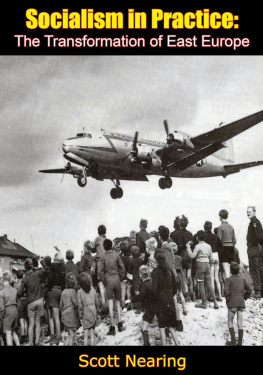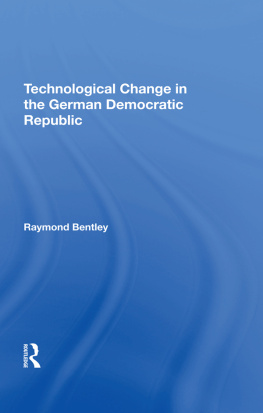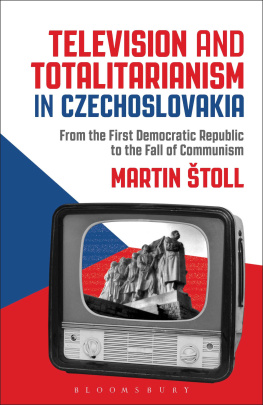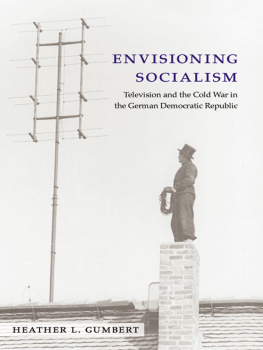Four-Color Communism
Four-Color Communism
Comic Books and Contested Power in the German Democratic Republic
Sean Eedy
First published in 2021 by
Berghahn Books
www.berghahnbooks.com
2021 Sean Eedy
All rights reserved. Except for the quotation of short passages for the purposes of criticism and review, no part of this book may be reproduced in any form or by any means, electronic or mechanical, including photocopying, recording, or any information storage and retrieval system now known or to be invented, without written permission of the publisher.
Library of Congress Cataloging-in-Publication Data
Names: Eedy, Sean, author.
Title: Four-Color Communism: Comic Books and Contested Power in the German Democratic Republic / Sean Eedy.
Description: 1st. | New York: Berghahn Books, 2021. | Includes bibliographical references and index.
Identifiers: LCCN 2020054287 (print) | LCCN 2020054288 (ebook) | ISBN 9781800730007 (hardback) | ISBN 9781800730014 (ebook)
Subjects: LCSH: Comic books, strips, etc.Germany (East)History and criticism. | Literature and societyGermany (East)
Classification: LCC PN6755 .E37 2021 (print) | LCC PN6755 (ebook) | DDC 741.5/9431dc23
LC record available at https://lccn.loc.gov/2020054287
LC ebook record available at https://lccn.loc.gov/2020054288
British Library Cataloguing in Publication Data
A catalogue record for this book is available from the British Library
ISBN 978-1-80073-000-7 hardback
ISBN 978-1-80073-001-4 ebook
For Debbie, my Liebling
Acknowledgments
The author would like to thank the following for their assistance, their suggestions, their criticisms, and their support for my earlier work and with the completion of this book: Jos Alaniz, John D. Benjamin, James Casteel, Chris Chapel, Cristina Cuevas-Wolf at the Wende Museum, Jennifer Evans, Jane Freeland, Martina and Gnther Fuhlbrgge, Mel Gibson, Michael Goodrum, Mykelin Higham, David Hall, Gregor Hock and Petra Schmiech at Tessloff Verlag, Carolyn Kay, Sonja Klocke, Martha Kuhlman, the Kunow family, Peter Lorenz at Comicbibliothek Renate, Paul M. Malone, Dominique Marshall, Jennifer Rodgers, Corey Ross, Philip Smith, Ewa Staczyk, Brett Sterling, Neil Thornton, Guido Weihahn, Benjamin Woo, my readers at Berghahn, and the staff at the Bundesarchiv-Berlin-Lichterfelde.
Abbreviations and Terms
Abbreviations
CCA | Comics Code Authority |
DEFA | German Film Joint Stock Company (Deutsche Film-Aktiengesellschaft) |
DFD | Democratic Womens League of Germany (Demokratischer Frauenbund Deutschlands) |
DFF | East German Television Broadcasting (Deutsche Fernsehfunk) |
DM | Deutsche Mark |
FDGB | Free German Trade Union Federation (Freier Deutsche Gewerkschaftsbund) |
FDJ | Free German Youth (Freie Deutsche Jugend) |
FRG | Federal Republic of Germany (West Germany) |
GDR | German Democratic Republic (East Germany) |
HV | Office of Publishers and Booksellers (Hauptverwaltung Verlage und Buchhandel) |
JP | Ernst Thlmann Young Pioneers (Junge Pioniere, also Thlmann Pioniere) |
KPD | Communist Party of Germany (Kommunistische Partei Deutschlands) |
M | East German Mark (Ostmark) |
SBZ | Soviet Zone of Occupation (Sowjetische Besatzungszone) |
SED | Socialist Unity Party of Germany (Sozialistiche Einheitspartei Deutschlands) |
SMAD | Soviet Military Administration in Germany (Sowjetische Militradministration in Deutschland) |
SPD | Social Democratic Party of Germany |
USSR | Union of Soviet Socialist Republics, Soviet Union |
Vopo | Peoples Police (Volkspolizei) |
ZPL | Central Party Leadership (Zentrale Parteileitung) |
Terms
Alltag: everyday life
Durchherrschte Gesellschaft: thoroughly ruled society
FDJ-ler, FDJ-lerinnen: members of the Free German Youth (masculine, feminine)
Frsi, Frhlich sein und singen: Be Happy and Sing (childrens magazine)
Mosaik, Mosaik von Hannes Hegen: Mosaik by Hannes Hegen (comic)
Nischengesellschaft: niche society
Schund und Schmutz: trash and filth
Verlag Junge Welt: Young World Publishing
Verlag Neues Leben: New Life Publishing
Verordnung zum Schutz der Jugend: Regulations for the Protection of Youth
INTRODUCTION
Comics at the Intersection of State Power and Childhood

In the immediate aftermath of World War II in Europe, concerns over the acceptability and supposed harmfulness of comics were bolstered by the effects of Americanization on youth and how these issues affected the nation state, European civilization, and culture (Kultur).1 In the United States, Dr. Fredric Wertham, a German-American psychologist and one of the comic industrys most vocal opponents, suggested that comics indoctrinated children against the accepted rules of decency, comparing these publications to propaganda under European dictatorships. Although his science was questionable and less than objective, Wertham was not entirely wrong in this instance as comics were used by those very same dictatorships, just as they were by governments and the Church in the West. Werthams thoughts on comics sided with the social theory and philosophy of the Frankfurt School, associated with the Institute for Social Research at the Goethe University Frankfurt. Mass culture, the Frankfurt School contended, was used for the purposes of homogeniz[ing] society with false class consciousness and capitalist aspirations.2 In Werthams estimation, comics served this same function in Western society. Comics produced in North America, Europe, and even the Soviet Bloc during the 1950s, the latter being the subject of this book, were hotly contested sites of power between educators, parents, politicians, and their constructions of the state and of childhood and how those two interacted and related to one another. As spaces typically uncontrolled and unmonitored by adults, comics gave children a site in which to demonstrate their desires and make meaning of the spaces they created. In effect, children themselves, and the states perception of those children and their desires, were responsible in affecting the production of these comics and exerting their own modes of power over their contents.



